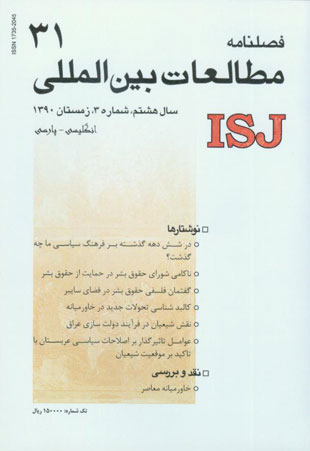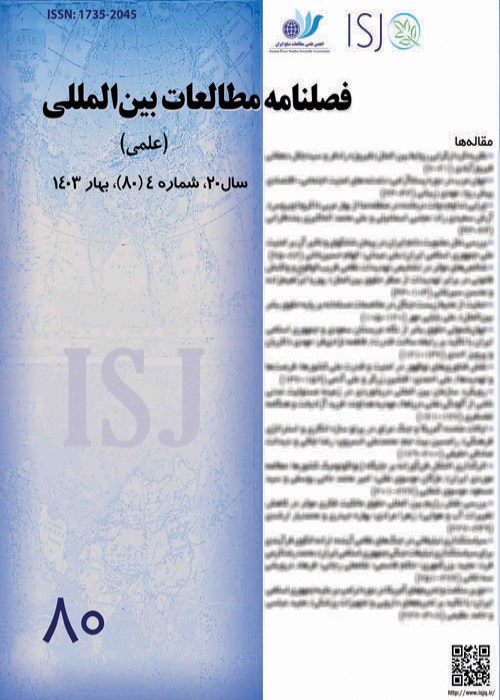فهرست مطالب

نشریه مطالعات بین المللی
سال هشتم شماره 3 (پیاپی 31، زمستان 1390)
- 212 صفحه، بهای روی جلد: 150,000ريال
- تاریخ انتشار: 1390/11/20
- تعداد عناوین: 7
-
- نوشتارها
- نقد و بررسی
-
صفحه 177
-
Page 1In a documentary analysis of the process of nation building in Iran of the age of modernity, shows that the eventful transfer of Monarchy from the Qajar dynasty to that of the Pahlavis in late 1920s, caused sentiments to take over prudence among the ruling elite of the country whereby seeking revenge by some of those related to the House of Qajar against the Pahlavis cast shadow over their sense of patriotism and this is where the problem started. Considering the fact that education under the Qajars was restricted to the House of Qajar, the Pahlavis were left with no option in their task of state and nation building but to rely upon them as the only educated class of the country. Though most of those related to the House of Qajar proved in practice that they preferred patriotism over tribalism, some of them walked over their sense of duty towards Iran and any thought of patriotism in seeking revenge from the man who overthrew their dynasty. Today the fall of the houses of Qajar and Pahlavi does not matter to the new generations of Iranians. But what matters to generations to come is recognition of the fact that the controversy arising from the transfer of monarchy from the Qajars to the Pahlavis at the start of the 20th century, and the failure of the Qajar related lords of tribal vengeance in removing the Pahlavis from Power in the middle of the 20th century which is still showing its unholy presence one way or another in our political culture, still is negatively effecting Iran’s process of a democratically inclined nation building. Unless there is an end to this ruinous legacy, there will not be an end to the culture of demagogy, lies and deceits that has since 1950s engulfed our political culture.Keywords: 28th of Mordad, Iran, coup detat, Mossadeq, political culture, tribal vengeance, England, America
-
Page 39Pursuant to the Israeli attacks on Gaza in December 2008 which caused to several killings of Palestinian civilians, particular women and children, the Human Rights Council with a view to protect human rights in Gaza, held a special session on January 12, 2009 and decided to dispatch a Fact-Finding Mission to be led by Judge Goldstone to Gaza. After the Goldestone Report was published on 15 September 2009, it became clear that numerous of war crimes and crimes against humanity were committed by the Israeli Army. The adoption of the Report by the Human Rights Council on 16 October 2009 and its endorsement by the GA on November 5, 2009, this promise was given that the Human Rights Council with would be able to take effective steps towards protection of human rights. However, while the Goldstone Report was of the view that the violations of international humanitarian law fall within the jurisdiction of the ICC, due to non-membership status of Israel and Palestinian to ICC Security Council’s refusal to refer the issue to the Court, the ICC could not be able to exercise its jurisdiction till now. Having said, it seems that the encouraging idea to protect human rights in Gaza has been entered to a disappointing point and the Human Rights Council is failed to have an effective role in protection of human rights of Palestinian people.Keywords: Human Rights Council, Jurisdiction, International Criminal Court, Violation of International Humanitarian Law, International Human Rights, War Crimes, Crimes against Humanity
-
Page 63The emergence of internet and its promotion provided new opportunity for human rights violators. There is some troubles in applying the classic human rights in cyberspace. Conflicts of some human rights rules in this space are more obvious and conflicts of some human rights rules in this space are new. This matter makes it necessary to provide new list of human rights in cyberspace. But for this purpose we should pass two introductive discourses: philosophical and political. Philosophical discourse pays attention to positively and negatively logical aspects of this act. So this paper assessed competent governor and jurisdiction in cyberspace. Then I mentioned to appropriate philosophical schools for regulating international human rights law in cyberspace and emergence of a new legal paradigm in cyberspace.Keywords: Cyberspace, International Human Rights Law, Philosophical Schools, CybersPace
-
Page 91The emerge of recent crisis in Middle East in beginning of second decade of third thousand in many countries such as: Tunisia, Egypt, Libya, Bahrain, and Yemen, create wave of fear and hope for people and international observers in this region. It is clear that, in the recent months none of states in Middle East are immune from created challenges. Nevertheless, there are some differences between critical states. There are also differences in reasons and results of protests in each country. It seems that a domino is created. But, honestly what are the roots of this high and unexpected movement of Muslim people? A quick consideration about this region events after Second World War, after cold war, after 11 September and recent events in Middle East show that some factor such as decline of political systems, cultural and identity legitimacy, economical crisis, political corruption, illegitimacy of political leaders, pressure and punishment, Islamism deployment and Islamic awakening are reasons of present critical situations.Keywords: Legitimacy Crisis, Identity Crisis, Islamism, Arabic Middle East, Islamic Revolution, Islamic Awakening
-
Page 121Contemporary Islamic movements have special position in events of Middle East region. Meanwhile groups, organizations and people in contrast with Baathist and interaction with current state building process have a significant role in Iraq. In this research we answer to this main question: what is the position of Shiite groups in power structure and state building in Iraq? In this context referring to the existence of a religious divide in Iraq, we explain the historical trend, the principle, goals, theory and objective approaches of these groups including Dawa al-Islamiya Party, the Islamic Supreme Council of Iraq and some of the scholars such as Ayatollah Sistani, Hakim and Moghtada Sadr. This paper utilities the documentary and library method for analyzing the role of Shiites in Iraq.Keywords: Shia, Iraq, State Building, Islam, Shia Clergy
-
Page 147Saudi Arabia is the most important Arab state that has not fully implemented US reforms after 9/11. United States applied all of its hard & soft power in order to implement American democracy in the middleast and replace old political regimes with new ones in Afghanestan and Iraq. Also other Arab states allowed reluctantly more activities for the opposite groups in due environmental pressure. Consequently Shiite groups in spite of the US wish they have got a new and very different historical position. However, Saudi - American style of reform has been partly implemented in Saudi Arabia. In a general review, two dimensions can be recognized in regard to the reform movement. Firstly: a series of reforms has been implemented by Saudi government. Due to the foreign powers pressure and regional and global events. Second one can be attributed to the demands of civic groups. A point to not in this regard is the position of Saudi Shiites. In the process of the reform movement, shiites have been among very important and influential minorities. The main question of this article is that what is most fundamental factor caused political and social reforms in Saudi Arabia in the tow recent decades particularly after September 11 with respect to the Shiite position? And then we will analyzise actions and reactions of Saudi Shiite community.Keywords: Shiite, Saudi Arabia, Political Reforms, US, September 11th attacks


